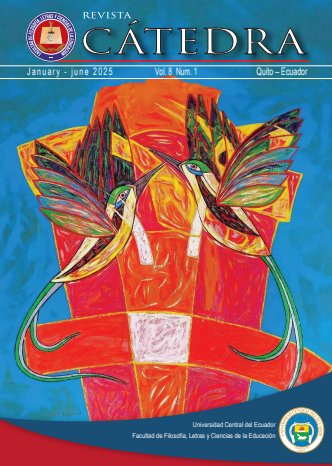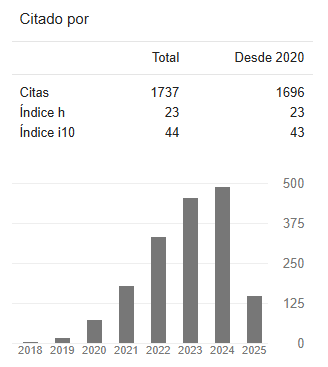‘‘Voces del miedo’’: podcasts de terror latinoamericano para el desarrollo de la expresión oral de estudiantes de educación básica superior
DOI:
https://doi.org/10.29166/catedra.v8i1.7046%20Palabras clave:
expresión oral, podcast, literatura de terror, fluidez verbal, innovación educativaResumen
El desarrollo de la expresión oral de los estudiantes de Educación Básica Superior continua como un reto, debido a que la mayoría de docentes sigue empleando metodologías tradicionales que no promueven la participación activa del estudiantado ni fomenta su creatividad. Esto resulta crucial debido a que las habilidades de expresión oral son fundamentales para garantizar el éxito académico, profesional y social del alumnado. Pese a los esfuerzos previos con la utilización de métodos tradicionales como las exposiciones o lecturas en voz alta no se ha logrado obtener resultados relevantes. Por lo cual, este estudio propone a los podcasts de terror latinoamericano aplicados en el contexto educativo como una estrategia didáctica innovadora que contribuye a potenciar la expresión oral de los estudiantes de Educación Básica Superior por medio de una metodología conectada a las TIC que incentive su potencial. El estudio se desarrolló a través del análisis de la muestra descriptiva a 1 072 docentes de diferentes instituciones educativas del Ecuador que participaron en la encuesta de Factores Asociados de la evaluación Ser Estudiante 2022-2023 y a 24 docentes encuestados por Loja et al. (2020) cuyos hallazgos demuestran que el 62. 5% de docentes encuestados no implementan el podcast como parte de sus estrategias en el desarrollo de habilidades de expresión oral. De tal manera, se propone implementar los Podcasts de Terror Latinoamericano como parte de la labor docente como una estrategia novedosa, vinculada al aspecto tecnológico y cultural.
Descargas
Citas
Acosta Faneite, S. F. (2023). Los enfoques de investigación en las Ciencias Sociales. Revista Latinoamericana Ogmios, 3(8), 82–95. https://doi.org/10.53595/rlo.v3.i8.084
Cárdenas López, S. P., & Hernández Hernández, D. Y. (2024). La importancia de las tradiciones orales como medio para fortalecer el desarrollo de la identidad cultural en la educación. Ciencia Latina Revista Científica Multidisciplinar, 8(3), 6101–6126. https://doi.org/10.37811/cl_rcm.v8i3.11809
Cevallos Tuárez, J. (2022). Estrategia didáctica para desarrollar la comunicación oral entre el docente y los estudiantes de sexto año de Educación General Básica. Didasc@lia: Didáctica y Educación, 13(4), 341–361. https://revistas.ult.edu.cu/index.php/didascalia/article/view/1518
Guevara Alban, G., Verdesoto Arguello, A., & Castro Molina, N. (2020). Metodologías de investigación educativa (descriptivas, experimentales, participativas, y de investigación-acción). RECIMUNDO, 4(3), 163–173. https://recimundo.com/index.php/es/article/view/860
Leal Macias, O., & Abalo Nabarro, E. (2023). Estrategias lúdico-pedagógicas para el fortalecimiento de la oralidad en estudiantes de secundaria. Dominio de las Ciencias, 9(2), 1250–1265. https://dominiodelasciencias.com/ojs/index.php/es/article/view/3343
Loja-Gutama, B. D., García-Herrera, D. G., Erazo-Álvarez, C. A., & Erazo-Álvarez, J. C. (2020). Podcast como estrategia didáctica en la enseñanza de la expresión oral y escrita. CIENCIAMATRIA, 6(3), 167–192. https://doi.org/10.35381/cm.v6i3.395
Mayorga-Ponce, R. B., Monroy-Hernández, A., Hernández-Rubio, J., Roldan-Carpio, A., & Reyes-Torres, S. B. (2021). Programa SPSS. Educación y Salud Boletín Científico Instituto de Ciencias de la Salud Universidad Autónoma del Estado de Hidalgo, 10(19), 282–284. https://doi.org/10.29057/icsa.v10i19.7761
Menéndez Giler, M. C., & Zambrano Intriago, G. Z. G. (2022). Estrategia para el desarrollo de la expresión oral, a través de la asignatura Lengua y Literatura en los estudiantes de séptimo año de Educación General Básica. Revista Cognosis, 7(EE-I), 15–34. https://doi.org/10.33936/cognosis.v6i3.3283
Pérez Ripossio, R. (2023). El análisis cualitativo con ATLAS.ti 22 en ciencias sociales: nuevas herramientas y aplicaciones concretas. Perspectivas Metodológicas, 23, 1–10. https://revistas.unla.edu.ar/epistemologia/article/view/4324
Descargas
Publicado
Versiones
- 2025-07-02 (3)
- 2025-07-02 (2)
- 2025-01-30 (1)









